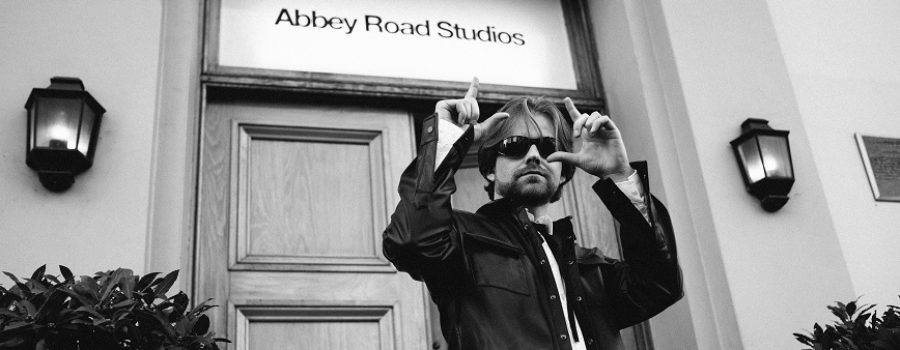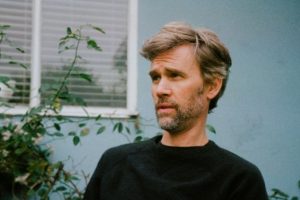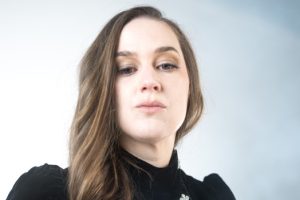No matter where life leads, our hearts and souls are forever bound to the initial place we called home. Kyle T. Hurley may’ve set down roots here and there, and most currently in London but this Philly boy can always pull inspiration from home. Whether it’s a sociological take put to song, or something else observational, Philly flows through him. Philly and so much more – he definitely owes me a drink for the “more” – but even though he held back a little, it wasn’t much as he went deep with so much in this back and forth.
Kendra: Some time ago you packed up and headed west from Philly to LA to pursue your career but then hopped on a plane to build a name for yourself in London. Had you heard the UK was a better place for musicians or was it one of those whim decisions that happened to pan out?
Kyle T. Hurley: It was a calculated decision. The music scene in London, and the UK in general, is, in my opinion, better for up-and-coming artists than that of Los Angeles. I say that the lights in LA are so bright that they burn away young talent; the new artists don’t have a scene in which to grow the way they used to there. The Laurel Canyon scene with Joni Mitchell and Neil Young is long gone.
The Eagles met and pretty much formed at the open-mic night The Troubadour had- now, not only do they not have an open mic, but bands have to pay to play there. What a difference. The success the LA music scene had in the seventies and eighties just killed the young art there, again, in my opinion. The Whiskey, The Viper Room, The Rainbow; these are all shadows of their former selves. I’d argue even Greenwich Village in New York succumbed to the same fate. The Bitter End, the Cafe Wha?- these places were once artistic. Now I think they’re just “cool.”
I’m not slighting them at all, and it’s cool to say that you’ve played there, but they don’t offer a scene for artists to grow in like they used to. If you’re famous or almost famous you can live like a king there, but if not, then I think your time is better spent finding a scene to grow in. That’s what London offers, especially in Camden. And moving to the UK is something a lot of artists did in the beginning, Dylan and Hendrix included.
So I’ve been growing in the London scene and meeting a lot of people. Robin Banerjee plays on my album, and he was Amy Winehouse’s guitarist. So the magic here is real and I’ve been involved with a growing label here called Spiritual Records. They are doing some great things at the grassroots level with young artists. If I may, some magical artists I’d keep an eye out for are Dom Glynn, William Poyer, Jack Trouble and Bandini. I’ve seen them all cast a musical spell and it’s a strong one- one that’s affected me as an artist and this single.
Kendra: I’m a sucker for consistency. Like when a TV show has the name number of episodes each season. Much like your albums always consisting of 10 tracks. Is that a lucky or magic number for you in any way?
Kyle T. Hurley: Funny you picked up on this, I was wondering if anyone would ever notice that.
I never knew when to stop working on an album. And I always questioned, do I put out an album or an EP or just a single? Going the latter route is what most artists do today, and fair enough, but I refuse to accept that albums are dead.
In a world of streaming, I think it’s important to remember the significance of an album. It takes on a life of its own that a single or EP never could. So then the question becomes what is an album? Five songs? Ten? Fifteen? I struggled with that a lot because on one hand you don’t want to be lazy and say you’re releasing an album and put out five songs when it’s just an EP. On the other hand, you don’t want to get paralysis by analysis and Chinese Democracy and spend so much time collecting your material that you never actually get around to getting something out in a reasonable amount of time. So I just looked at my favourite albums, counted the songs, and averaged them together. Ten is what I got, so that’s what I typically aim for. I see that as my attempt to preserve what an album is.
Kendra: How do you feel you’ve personally grown as a songwriter from ‘Kyle T Hurley’ to ‘Kyle T Hurley III?’
Kyle T. Hurley: I think I’ve taken more chances and been riskier in what I’ve done. It’s hard not to rely too much on your influences. I feel I’ve become more original- but what does that mean? If your influences are inescapable, can anyone be truly original? I try to echo artists from the past that have influenced my core, work with my best strengths as a musician, and put my own experiences and observations into my songs. I can say I’ve done that more so for this past album than before, so in that sense, I’ve grown. To be honest, I think that will be even more so the case for my next album, Kyle T. Hurley IV, which is in the works.
Kendra: Growing up in a city like Philly can’t always be the easiest and you wrote about that, the violence, in “Killadelphia.” Was there one incident you’ve carried all these years that sparked this song to come about in the present?
Kyle T. Hurley: Tough question. The album ‘Blood on the Tracks’ is clearly autobiographical, but Dylan has constantly denied that despite it obviously being about the breakup of his marriage at the time. Freddie Mercury said in interviews that when someone from the band brought in a song they wrote, it was an unwritten rule that the members of Queen wouldn’t ask what the song was about because that’s such a personal question.
So it’s a personal question, but an important one. Suffice it to say someone close to me succumbed to the violence and racism of Philadelphia. It’s no mistake I mention OJ Simpson by name in this song. Some people know about his story; I lived my version. To really do it justice though, we’d have to grab a pint and I’d tell you a real colourful tale. But for purposes of this interview, I think that Elvis Presley said it best when he said, “I learned very early in life that without a song the day would never end. Without a song, the road would never bend, without a song, not many got a friend, without a song…so I keep singing the song.”
Kendra: You also mention gentrification at one point in “Killadelphia.” That’s something that’s interested me for a long time because on one hand neighborhoods get cleaned up but on the other, particular people get pushed out. What major effects has gentrification had on Philly since you were growing up?
Kyle T. Hurley: In my opinion, gentrification takes generations to accomplish. Philly has traditionally been racially segregated. That’s just a cold, hard fact. So you can’t just make a neighbourhood safe by cleaning it up on the surface, you need to repair the racial segregation that was on a pedestal in Philly, and that takes time.
Slaves were bought and sold in downtown Philly, so gentrification doesn’t mean we just ignore facts like that. We respect those facts and accept that any significant evil takes an equally significant amount of time to be made good. Now I’m not in any way slighting Philly for that. Philadelphia is a great city. It’s a hot-bed of culture and a place I think everyone should visit due to the positive history and music that has come out of there. But we can’t forget what happened there to black people, and how it created a black culture and a white culture.
From what I’ve seen, gentrification is about bringing the two cultures together; the inner city, with all its positive and negative history, and the suburbs. A story like OJ Simpson’s is the darker side to gentrification gone wrong. Philly didn’t get the nickname Killadelphia for no reason, but things are changing. Gentrification is generational healing, one which will continue to make a city like Philadelphia a model for other parts of the world with similar issues.
Kendra: With a new album out this year, will you be touring the UK or the US anytime before spring or will you be waiting until the warmer months?
Kyle T. Hurley: I am looking at the new year now and where I’ll be playing. I like the scene in London so I’ll be active there and looking at playing in LA, Philly, and New York again.






